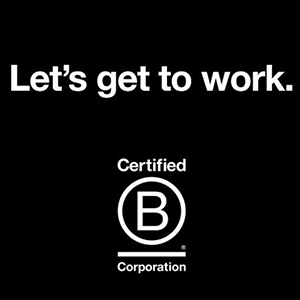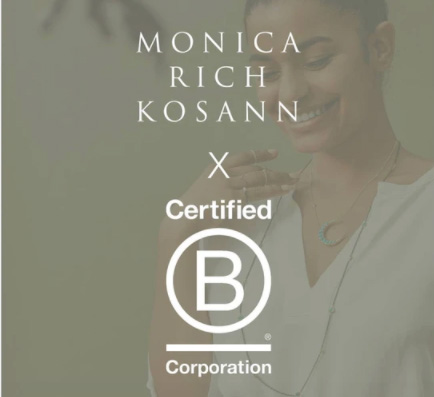
Jewelry designer Monica Rich Kosann reached out to JCK last week to let us know that her eponymous fine jewelry brand had achieved Certified B Corporation status.
What that means, we discovered, is that the New York City–based firm has joined a coterie of companies that have met a series of sustainability standards designed to help grow for-profit businesses into forces for positive change in the world.
B Lab, the nonprofit that conducts the impact assessments that lead to B Corp certification, was founded in 2006 by friends Jay Coen Gilbert, Bart Houlahan, and Andrew Kassoy, who left careers in business and private equity to create an organization “dedicated to making it easier for mission-driven companies to protect and improve their positive impact over time,” according to the organization’s website. The first 82 B Corps were certified in 2007.
It’s since snowballed into a global movement, and leading sustainable brands including Patagonia and Eileen Fisher have become B Corps, defined by the organization as “businesses that meet the highest standards of verified social and environmental performance, public transparency, and legal accountability to balance profit and purpose.”
The goal of B Lab is to form an ever-ballooning armada of B Corps that accelerate shifts that redefine the concept of success in business and help build a more inclusive and sustainable economy.

What makes B Corp certification more stringent than other sustainability certifications out there is this: B Corps are required to embed stakeholder governance into their articles of association, “legally committing themselves to making decisions through the lens of a triple bottom line: profit, people and planet,” reported Vogue Business earlier this month.
So if, for instance, a B Corp retailer unceremoniously lays off its staff during the pandemic or leaves manufacturers high and dry with unpaid merchandise, it could potentially lose its B Corp certification.
More than 100,000 businesses have signed up for the B Corp assessment since its launch in 2006, but just roughly 3,500 companies have become B Corp certified. And companies need to be recertified by B Labs every three years.
Businesses that apply for B Corp certification are put through a rigorous assessment that focuses on five broad areas: governance, workers, customers, environment, and community. (Kosann said the process took about a year for her company.) Then the businesses are graded on a points system, with 80 points needed to become a B Corp.
The high standards for companies underscore the movement’s even loftier goals, which include lowering poverty levels and supporting equality, healthier environments, stronger communities, and the creation of more high-quality jobs “with dignity and purpose,” according to the organization.
Kosann says the process of getting certified “grew from both our operating history and our brand mission statement—we create jewelry to be a permanent part of lives for generations, all the while challenging ourselves to keep being better for our teams, our suppliers, our customers, and the communities we operate within.”
There are currently 16 Certified B Corporation jewelry companies, and those include Vancouver, Canada’s Pyrrha, which has an 84.7 rating, and Tigard, Ore., customizable jewelry brand MiaDonna, which has a 92.9 rating. Monica Rich Kosann, the newest jewelry company to hurdle the bar, has an 80.1 rating.
Companies interested in applying for B Lab’s impact assessment can begin here.
Top: An Instagram graphic from B Corporation (image via @bcorporation)
Follow me on Instagram: @emilivesilind
- Subscribe to the JCK News Daily
- Subscribe to the JCK Special Report
- Follow JCK on Instagram: @jckmagazine
- Follow JCK on X: @jckmagazine
- Follow JCK on Facebook: @jckmagazine